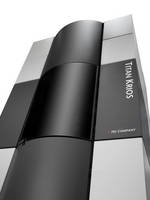Monash University Orders High-End Transmission Electron Microscope from FEI for Integrated Structural Biology

World-class research facility will integrate cryo-EM with X-ray diffraction, nuclear magnetic resonance, synchrotron-based approaches and computational techniques to determine atomic structure and functional mechanisms of medically-important protein complexes.
Hillsboro, Ore. –Â FEI (NASDAQ: FEIC) today announced that Monash University, a world-leading research facility in Melbourne, Australia, has ordered a Titan™ Krios cryo transmission electron microscope (TEM) and Tecnai™ T12 TEM for applications in the growing field of integrated structural biology. FEI’s Titan Krios TEM is one of the most powerful and flexible high-resolution cryo electron microscopes (EM) for characterization of protein structures and protein complexes. The instrument at Monash will be equipped with FEI’s latest camera system, the Falcon II, providing breakthrough imaging capabilities.
Researchers at Monash will combine cryo-TEM’s molecular-scale, three-dimensional (3D) imaging and analysis capabilities with atomic-scale structures determined using techniques such as X-ray diffraction (XRD) at the nearby Australian Synchrotron. Powerful computational approaches deployed on the national specialized supercomputer for image processing (known as “MASSIVE”, located at Monash University and the Australian Synchrotron), will permit scientists to interpret and analyze the complex datasets. The integration of cryo-EM with the many different complementary imaging technologies located on and around the Monash Science Technology Research and Innovation Precinct will enable researchers to make key discoveries that relate to conditions such as cancer, cardiovascular disease and diabetes.
“Cryo-EM provides the missing piece of the puzzle for researchers trying to understand the workings of complex biological systems at the smallest scale, where we know that tiny multi-component molecular machines perform many of the most important functions,” explains Professor James Whisstock, of Monash University’s Department of Biochemistry and Molecular Biology. “These TEMs will give Australian scientists a new capability to study proteins that to date have resisted detailed characterization.”
“Monash is one of the top XRD research sites in the world, comprising over 150 world-class researchers pioneering the new field of integrated structural biology,” commented Peter Fruhstorfer, vice president and general manager of FEI’s Life Sciences Business Unit. “The Titan Krios promises to play a pivotal role in this exciting new discipline by providing the molecular-scale framework into which data from complementary atomic-scale techniques and computational methods are integrated.”
With automated sample loading and unattended 24-hour operation, the Titan Krios enables the collection of the massive data sets, which are required by advanced structural analysis techniques but are difficult or impossible to obtain with manual methods. Its cryo capability ensures that the analytical results accurately represent the structures as they exist in their natural cellular environment. The Tecnai T12 instrument will provide a dedicated support capability, permitting preliminary testing of samples prior to automated data collection using the Titan Krios TEM.
Fruhstorfer added, “The Falcon II camera is a critically-important component of the new Titan Krios TEM. The camera is seamlessly integrated with the Krios hardware and operating software and provides a significant improvement in detection efficiency. The new camera in the Titan Krios TEM dramatically increases the amount of information that can be acquired from delicate biological structures. We expect the new camera to enable breakthrough discoveries as we enter this nascent field of integrated structural biology.”
Installation of both microscope systems is planned for Q2 2014. The instruments will be located in the new Clive and Vera Ramaciotti Centre for Structural Cryo Electron Microscopy at Monash University. The new facility was established with the support of The Ramaciotti Foundations, the Australian Research Council, the National Health and Medical Research Council of Australia, Monash University, The Walter and Eliza Hall Institute of Medical Research and La Trobe University.
The new facility will complement the Monash Centre for Electron Microscopy, which provides a world-class capability for microscopy of non-biological materials and includes one of the world’s first “double-aberration corrected” Titan3 80-300 electron microscopes from FEI.
For more information about the Titan Krios TEM for structural biology, please visit http://www.fei.com/life-sciences/structural-biology/.
About Monash University
Monash is the youngest member of the Group of Eight, the coalition of Australia’s most prestigious research-intensive universities.
With more than 270,000 graduates across the world, campuses in Australia, Malaysia and South Africa, an education and research centre in Italy, a joint-research academy in India, the Southeast University-Monash University Joint Graduate School in Suzhou, China and a truly unique alliance with the University of Warwick in the UK, Monash is a global university with the ambition and ability to address momentous global challenges.
The desire to make a difference informs everything the University does, not least of all its research. Monash researchers are committed to research which has an impact well beyond the academic sphere. Their thirst for positive change is matched by their ability to create it, and has been for more than fifty years.
About FEI
FEI Company (Nasdaq: FEIC) designs, manufactures and supports a broad range of high-performance microscopy workflow solutions that provide images and answers at the micro-, nano- and picometer scales. Its innovation and leadership enable customers in industry and science to increase productivity and make breakthrough discoveries. Headquartered in Hillsboro, Ore., USA, FEI has over 2,500 employees and sales and service operations in more than 50 countries around the world. More information can be found at: www.fei.com.
For more information contact:
Sandy Fewkes (media contact)
MindWrite Communications, Inc.
+1 408 224 4024
sandy@mind-write.com




